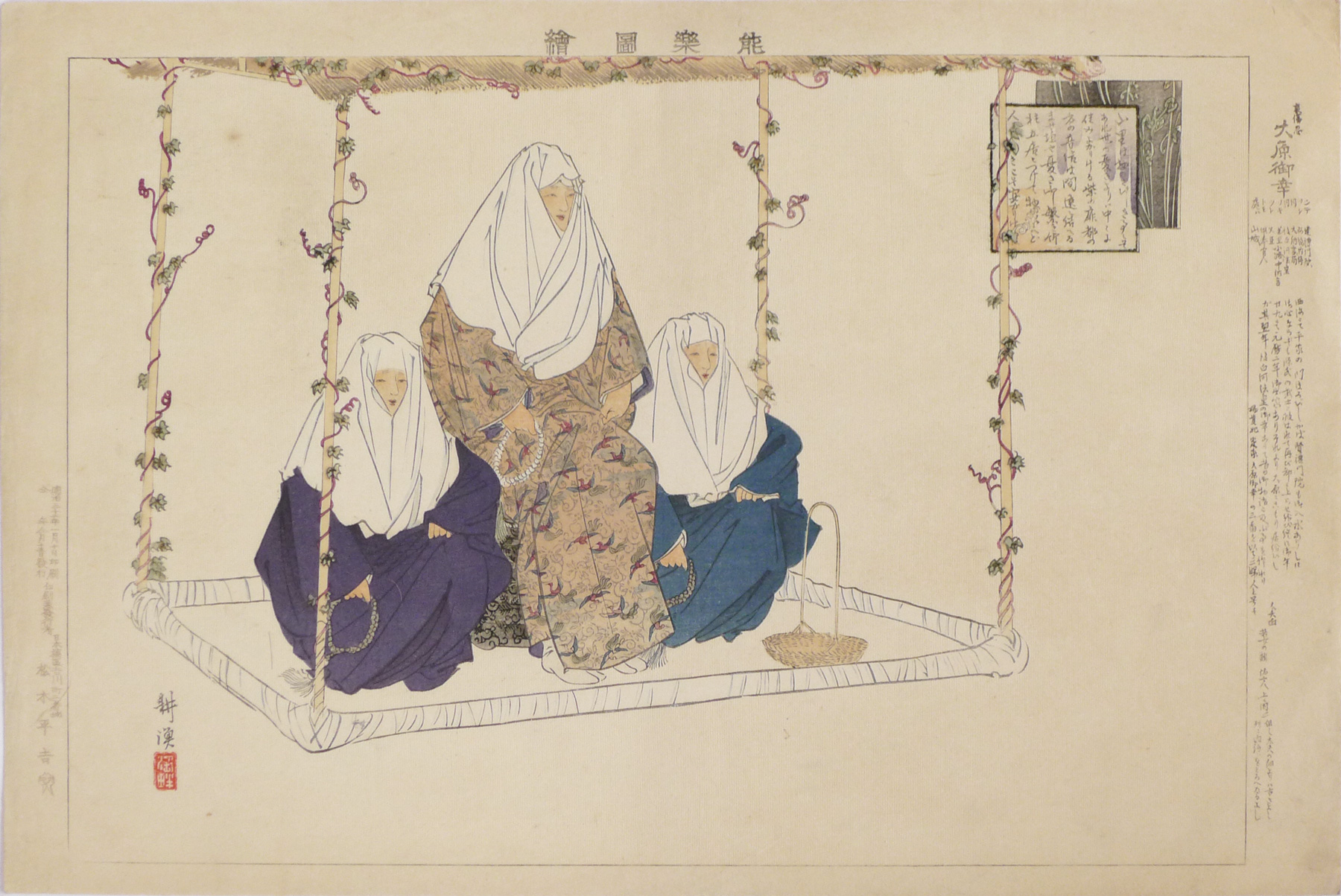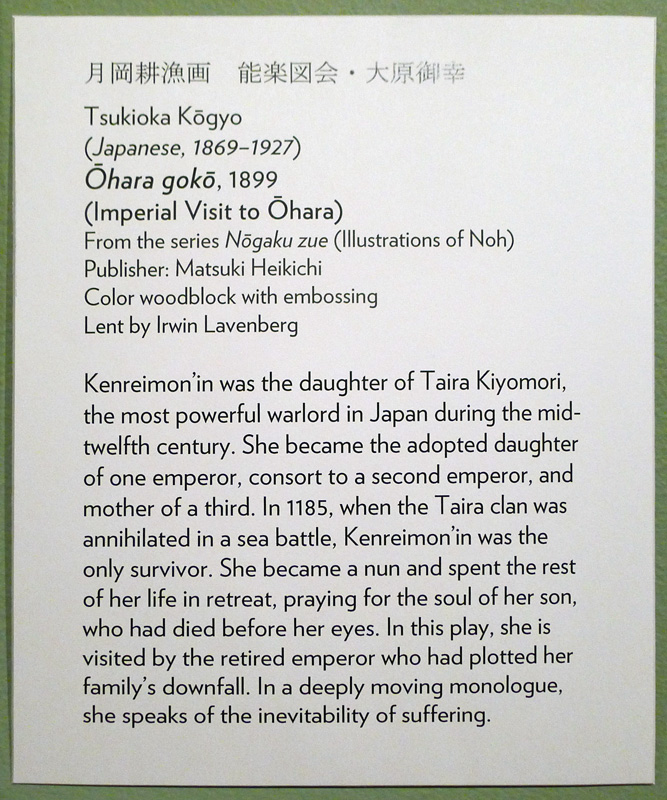About This Print
One of 261 prints from the series Nōgakuzue (Illustrations of Noh). The print depicts the former Empress Kenrei who has become a nun with her two attendants, Lady Dainagon and Lady Awa, in her hut (represented by a bamboo framework) at a convent in the hills of Kyoto.
The text in the cartouche reads:
The text in the cartouche reads:
| Earlier in this life behind the brushwood gate. From the Capital tidings approach sparingly woven hedges, countless the moments of sadness like the joints in the bamoo pillars. Rising and sitting always with sad thought, and yet in being free from others' eyes, we find peace.1 |
For background on the Noh theater see the article on this site "Noh - A Brief Summary by Beata Kubiak Ho-Chi".
1 The Beauty of Silence: Nō and Nature Prints by Tsukioka Kōgyo (1869-1927), Robert Schaap & J. Thomas Rimer, Hotei Publishing, 2010, p. 79.
The Play - Ohara gokō
Source: A Spectator’s Handbook of Noh, Murakami Upton, Yoshiko Upton, Wanya Shoten, Tokyo, 1968. p. 55 and as footnoted.
Background
After the Heike Clan were destroyed at Dannoura in 1185, the former Empress Kenrei retired to a little hut in the mountains with two of her former ladies-in-waiting, Lady Dainagon and Lady Awa, spending her days in prayer for the souls of her son the infant Emperor Antoku and her mother, drowned at Dannoura. The empress, foreseeing defeat, had jumped into the sea with her mother and son, the child emperor. The child and his grandmother drowned, but the empress was pulled from the water by an enemy soldier.1
1 The Walters Art Museum website http://art.thewalters.org/viewwoa.aspx?id=1530
The Play
A Court official (waki tsure1) announces that Goshirakawa, a retired emperor, is to visit Kenrei (shite2).
Kenrei's hut (tsukurimono) is revealed by uncovering the hut's framework and her way of life here is described in song. She leaves with Lady Dainagon (tsure3) to collect herbs of the mountain to use for offerings.
Goshirakawa (tsure) and his attendants (waki4 and waki tsure) arrive by carriage, one of the attendants describing the quiet serenity and Goshirakawa reciting a poem.
Informed as to where Kenrei has gone, they wait.
Returning, the women pray for the Emperor Antoku and the Heike people who were killed. Goshirakawa's visit recalls her life at Court in contrast to the present, filling her with nostalgia.
Again in her hut, she reminisces on the days when she lived a colorful and sophisticated life as Empress. She relates her flight with her mother and her infant son, the Emperor, in company with the Heike army, until they were driven into the sea at Dannoura. Her mother leaped from a boat with the infant Emperor in her arms and both were drowned.
Kenrei also tried to drown herself but was rescued, so lives now like this in devotions and somber sadness.
2 shite is the main actor
3 tsure is the shite's companion
4 waki performs the role that is the counterpart or foil of the shite.
Special Exhibition
NOH Dance Drama of the Samurai NOV 17, 2012 – FEB 24, 2013
click on image to enlarge
Print Details
| IHL Catalog | #206 |
| Title | Ohara gokō 大原御幸 (Imperial Visit to Ohara) |
| Series | Nōgakuzue 能樂圖繪 (Illustrations of Noh) |
| Artist | Tsukioka Kōgyo (1869-1927) |
| Signature | Kōgyo |
| Seal |  White letter seal in a rectangular shape with double border: 湖畔 [Kōhan] White letter seal in a rectangular shape with double border: 湖畔 [Kōhan]Kōhan [ 湖畔], seal no. 59, p. 171 in The Beauty of Silence: Nō and Nature Prints by Tsukioka Kōgyo (1869-1927), Robert Schaap & J. Thomas Rimer, Hotei Publishing, 2010. |
| Date | Printed on January 10, 1899 / Issued on January 15, 1899 (Meiji 32) 明治三十二年一月十日 印刷仝年仝月十五日発行 The ARC database entry for their print arcUP0748 carries the same dates as this collections print, as follows: 明治三十二年一月十日印刷仝年仝月十五日発行 |
| Edition | unknown |
| Publisher | Matsuki Heikichi (Daikokuya Heikichi 大黒屋平) [Marks: pub. ref. 029] |
| Carver | |
| Impression | excellent |
| Colors | excellent |
| Condition | good - not trimmed; not backed, minor soiling, light toning, several spots of foxing |
| Genre | ukiyo-e |
| Miscellaneous | Background is covered with light small checkerboard embossing. Portland Art Museum loan number L2012.113.1 |
| Format | oban yoko-e |
| H x W Paper | 9 7/8 x 14 3/4 in. (25.1 x 37.5 cm) |
| H x W Image | 8 3/4 x 13 in. (22.2 x 33 cm) area within printed black border |
| Collections This Print | The British Museum 1949,0409,0.27; The Walters Art Museum 95.247; Art Institute of Chicago 1939.2258.112; Art Research Center, Ritsumeikan University arcUP0748, UP0957; Museum of Fine Arts, Boston 53.2928.13; University of Pittsburgh 20091209-kogyo-0289. |
| Reference Literature | The Beauty of Silence: Nō and Nature Prints by Tsukioka Kōgyo (1869-1927), Robert Schaap & J. Thomas Rimer, Hotei Publishing, 2010, p. 79, pl. 24. |



